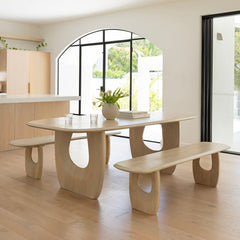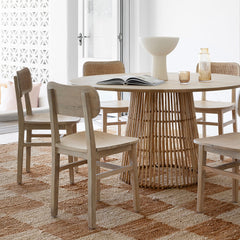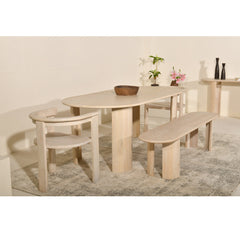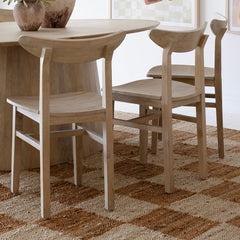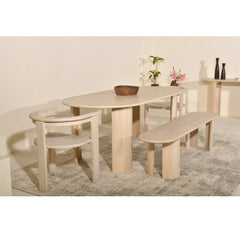Dining Table Styles in Australia: A Complete Guide to Choosing Your Perfect Table
A dining table is more than just a place to eat. It’s where stories are shared, ideas unfold, and everyday moments turn into lasting memories. But with so many dining table styles available—each with their own aesthetic, materials, and practical features—choosing the right one for your home can feel like a big decision.
In this guide, we’ll walk you through the most popular dining table styles in Australia, along with handy tips on table shapes, materials, and what to consider before making your choice. Whether you’re furnishing a new home, revamping your space, or sourcing tables for a commercial venue, this guide is here to help.
Popular Dining Table Styles in Australia
Let’s start with the fun part—style. Choosing a dining table that fits your aesthetic helps tie the whole space together.
|
Style |
Key Features |
Best Suited For |
|
Scandinavian |
Light timber, minimal, airy |
Modern, minimalist homes |
|
Farmhouse |
Solid wood, rustic, large |
Family dining spaces, heritage homes |
|
Industrial |
Timber + metal, raw finish |
Lofts, warehouse conversions |
|
Hamptons/Coastal |
Whitewashed timber, cross-legs |
Coastal, bright and airy interiors |
|
Mid-Century |
Slim, tapered legs, vintage timber tones |
Retro-modern interiors, smaller spaces |
|
Modern |
Glass or stone top, clean lines |
Open-plan, contemporary homes |
|
Traditional |
Dark timber, ornate legs, classic shape |
Formal or traditional dining rooms |
Modern & Contemporary
Modern dining tables are all about clean lines, simplicity, and functional design. Think neutral colours, glass or stone tops, and minimalist timber finishes. These tables are right at home in open-plan apartments or sleek, contemporary homes.
Scandinavian
Scandi style is relaxed, natural, and fuss-free. Expect light-coloured timbers like oak, simple silhouettes, and tapered legs. These tables bring a bright, airy feel and are perfect for those who want a calming, minimalist look with a warm touch.
Industrial
Raw, edgy, and full of character. Industrial-style dining tables often mix timber and metal and are known for their robust build and urban appeal. They work well in loft-style spaces or homes with exposed brick and a bit of grit.
Coastal / Hamptons
Inspired by Australia’s beach lifestyle, Hamptons and coastal tables feature whitewashed or pale wood finishes, panelled legs, and a breezy, elegant feel. They’re great for homes with a light colour palette, natural textures, and indoor-outdoor living.
Farmhouse / Country
Solid and inviting, farmhouse dining tables are made for big families and generous meals. Typically crafted from timber with rustic finishes, these tables bring a touch of tradition and warmth, especially in larger or heritage-style homes.
Mid-Century Modern
For a retro yet timeless feel, mid-century modern tables offer slim profiles, rounded corners, and classic timber finishes like walnut or teak. They suit both modern apartments and eclectic homes that mix old and new.
Traditional
Characterised by ornate detailing, turned legs, and dark finishes, traditional dining tables suit heritage homes and formal dining rooms. They bring elegance and a sense of permanence to a space.
Choosing the Right Shape
The shape of your table isn’t just about looks—it affects how you move around the room and how people interact.
Round
Great for smaller dining areas or square rooms. Round dining tables encourage conversation and feel relaxed. They usually seat 4–6 people comfortably and are ideal when you want to maximise space.
Rectangular
The most common shape, and for good reason. Rectangular tables work well in long rooms and can accommodate more guests. A table around 180–240cm long is usually perfect for families or frequent entertainers.
Square
Balanced and space-efficient. Square tables seat 4–8 and are best in square rooms or open-plan spaces where you want a more casual, symmetrical feel.
Oval
Oval tables give you the length of a rectangle with softer curves. They’re less bulky visually and ideal if you want something that feels a bit more formal but still relaxed.
“Make sure there’s at least 90cm of clearance around the table to allow chairs to move comfortably. Use masking tape to mark out the size if you're unsure.”
– said Kieran, co-owner of Bay Gallery Furniture.
Let’s Talk Materials
Material choice influences not only how your table looks but how it performs day-to-day.
Solid Timber
Durable and timeless. Woods like oak, ash, and walnut bring natural warmth and texture. With the right care, a timber table can last generations—but do use coasters and wipe up spills quickly.
Veneer / MDF
A more budget-friendly option that mimics the look of real wood. It’s low maintenance and can still look fantastic, especially in modern designs, but you can’t refinish it the way you can with solid timber.
Glass
A glass tabletop helps open up a room visually—great for smaller spaces. It’s easy to clean and looks sleek, but does show fingerprints and may feel a little less family-friendly for everyday use.
Marble or Stone
Stone tables are showstoppers—elegant and luxurious. Each one is unique. Marble in particular needs a bit of care (it’s porous and can stain), but if you’re after a statement piece, this is it.
Mixed Materials
Combining materials—like wood and metal or glass and timber—adds contrast and interest. These work well in industrial, modern, or transitional homes and can add character without overwhelming the space.
Tips for Making the Right Choice
Still not sure which way to go? Here are a few questions to ask yourself:
-
How do you use your table? If it's for everything from breakfast to homework, go durable. If it’s mostly for guests, you can prioritise design.
-
How many people do you regularly seat? Think about both day-to-day use and special occasions.
-
Do you need flexibility? Extendable tables are great for growing households or entertainers.
-
What else is in the room? Your table should complement your existing chairs, flooring, and lighting—but it doesn’t have to match everything perfectly.
-
What style makes you feel most at home? Trust your gut. The best table is one that makes you look forward to sitting down.
The perfect dining table balances practicality with personal style. Whether you’re after a classic oak rectangle, a bold marble showpiece, or a space-saving round table, the right choice depends on how you live—and how you want to feel when you sit down.
Bay Gallery’s range includes a curated selection of luxury designer dining tables across all major styles—from Scandinavian simplicity to coastal elegance. With a focus on quality materials and timeless design, you’re bound to find a piece that fits your space (and life) perfectly.
FAQs
❓What’s the best table shape for a small space?
Round tables are generally best—they maximise seating without creating harsh corners and can make a small room feel more open.
❓Are marble dining tables high-maintenance?
Marble needs a little care—it’s porous, so spills should be wiped up quickly, and coasters are a must. But the beauty and uniqueness of marble can be worth it.
❓Can I mix different chairs with my dining table?
Absolutely. Mixing chairs can make your dining space feel more relaxed and personal. Just make sure the heights align and there’s some cohesion in colour or material.
❓How big should my dining table be?
Allow about 60cm width per person for comfortable seating. A 6-seater should be around 180cm long; for 8 people, look at 220–240cm.
❓What’s better: timber or stone?
Both have strengths. Timber is warm, easy to pair with other furniture, and can be refinished. Stone is more of a statement and adds luxury, but requires more care.








